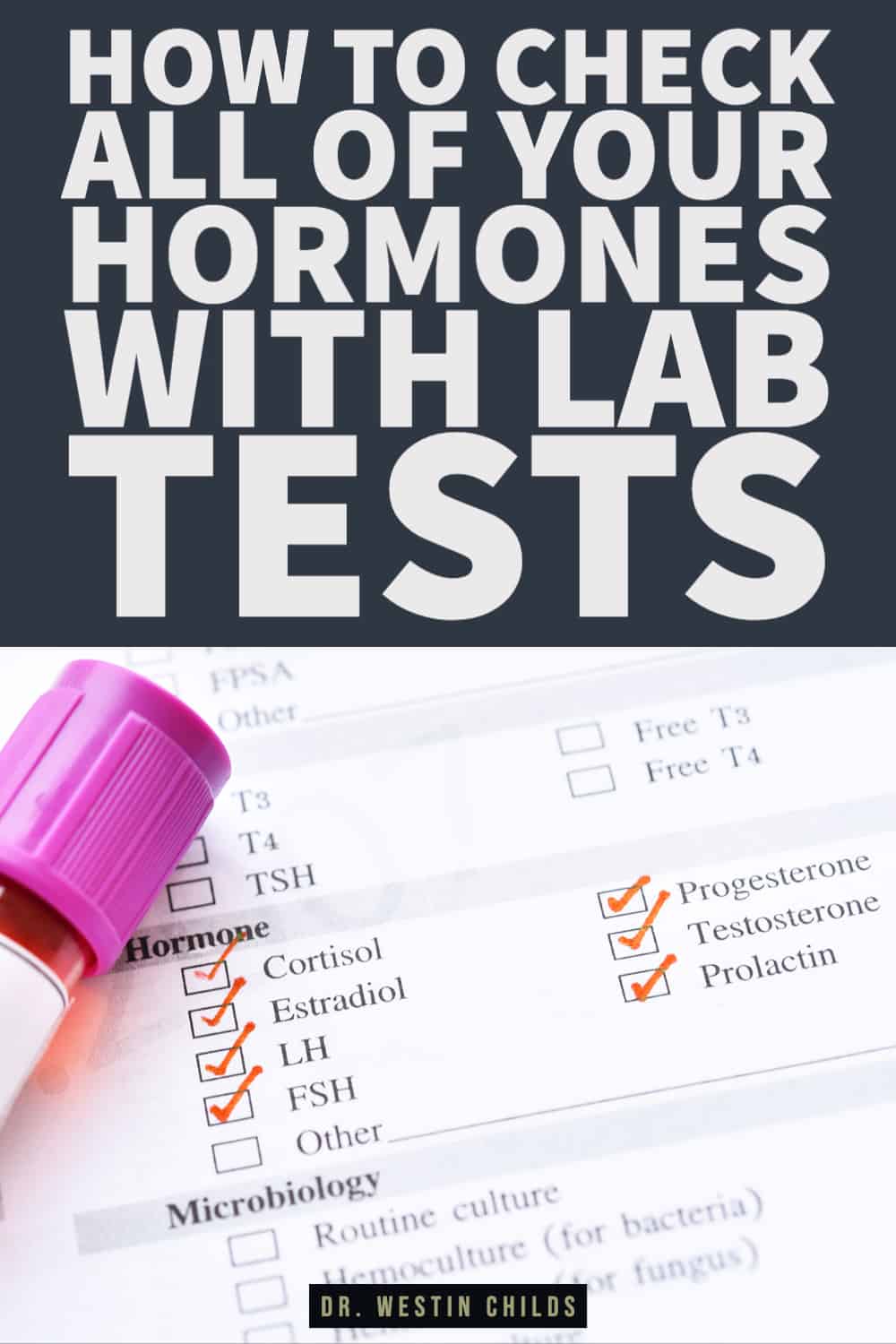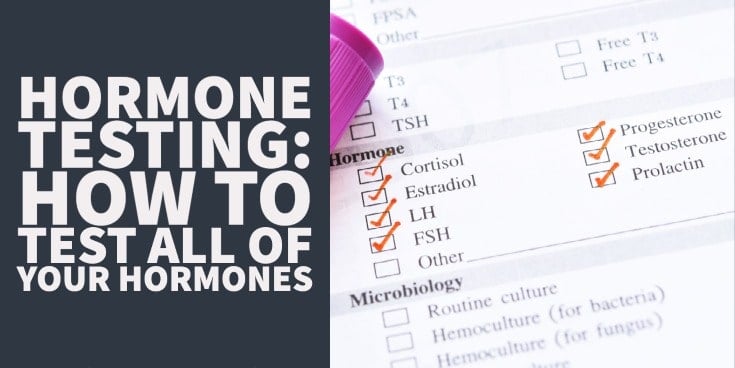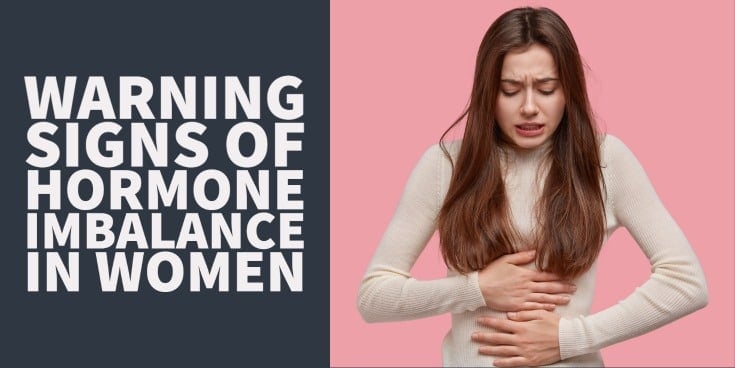Are you suffering from symptoms that you KNOW are related to your hormones?
This guide will walk you through hormone testing and includes a discussion about each major hormone system, the symptoms associated with each hormone system, and which tests you need to ask for in order to get proper testing.
Let’s jump in:
Hormone Testing Basics
Your hormones are among the most powerful molecules in biology and even small changes to hormone levels may result in BIG symptoms that will be felt on a daily basis (1).
In addition, many of the symptoms associated with slight hormone imbalance often manifest as lifestyle symptoms.
What do I mean?
Well, these symptoms tend to impact your quality of life and may manifest in various ways such as reduced energy, reduced libido, brain fog, mental fatigue and so on (2).
These imbalances are often felt when your hormones are in a state of imbalance.
Basically, it goes something like this:
There is a region or optimal “zone” that your hormones need to be in in order for you to have optimal health.
If your hormones drop below this optimal zone then you will become symptomatic (3).
Likewise, if they rise too high in this optimal zone then you may become symptomatic as well (4).
In this way, there are 2 major ways that your hormones can become dysregulated.
Another important point to understand when we discuss hormone balance is how we define it.
Hormone balance for YOU may be different than hormone balance for me.
For instance:
If we gather 100 people and line them up side by side we can expect that each person will have an optimal range of hormone levels which differs from the person to their left or right.
In this way, the total amount and range of your hormone levels will be unique to your body.
These two factors create an environment in which it can be difficult to test, understand and treat hormone imbalances.
But don’t let that scare you! There are ways that we can overcome these hurdles and we will discuss how to do that later.
Why Don’t Doctors Test your Hormones?
Another important aspect of hormone replacement therapy is to understand that most physicians (especially conventionally trained) do not specialize in hormone replacement or hormone management.
Much of the conventional world focuses on the management of chronic medical conditions such as hypertension and high cholesterol and little emphasis is put on treating lifestyle conditions such as energy, libido, and so on.
Hormone imbalance frequently results in symptoms that manifest as changes to energy levels, changes to libido, changes to mental clarity, and so on but these symptoms tend to largely be ignored by conventionally trained physicians.
This treatment paradigm has led many patients to seek out second opinions and other doctors in an attempt to start feeling better but many are left empty-handed.
If you suspect that you have a hormone imbalance in your body then it may be best to seek out physicians who are specialized in anti-aging medicine or functional/integrative medicine as these Doctors tend to have more training in hormone replacement therapies.
The reason for this has to do with the fact that conventional physicians often receive the majority of their post-residency training from pharmaceutical companies which tend to promote their own medications and they tend to leave out the discussion of bio-identical hormones.
Bottom Line: You may need to seek out physicians trained in functional, integrative, holistic, or anti-aging medicine to get optimal hormone replacement therapy. Most conventional physicians (including endocrinologists and primary care physicians) do not receive training in hormone replacement therapy.
Hormone Replacement Basics
When evaluating your hormones you also need to consider some of the basics when it comes to treatment.
There are two main ways that you can replace or manage hormone levels.
The first is through the use of synthetic hormones (these are not bio-identical).
Medications that fit into this classification include hormones such as birth control medications, synthetic progestagens (5), certain synthetic testosterone medications (6), and so on.
Synthetic hormones are hormones that have been slightly modified in such a way that allows pharmaceutical companies to patent them as a “novel” hormone.
They react in much the same way that bio-identical hormones do in the body, meaning they may sit on and activate hormone receptors at the cellular level.
But one of the main differences between synthetic hormones and bio-identical hormones is in the way that they are metabolized in the body.
The metabolizing process (or breaking down process) of synthetic hormones may leave by-products that your body is not used to eliminating and these by-products may cause some issues in the body and lead to unintended consequences (7).
For this reason, some people (including physicians) believe that a better approach to hormone replacement therapy is with the use of Bio-identical hormones.
Medications that fit into this classification often include the title USP at the end to denote that they are indeed bio-identical in nature.
An example would be supplementation with the hormone progesterone.
On the ingredient list, you will find the active ingredient “Progesterone USP”.
Compare this to other “synthetic progesterone” in which the active ingredient is often a progestogen.
The main difference between these two types of hormones is the way that they are utilized and metabolized by the body.
But even though some hormones are considered bio-identical doesn’t necessarily make them automatically the best.
You also need to consider the route that you are taking the hormone.
Remember that in normal physiology the body produces hormones from target organs and these hormones are injected directly into the bloodstream where they hit their target tissues.
Most of the medications (and this includes hormones) that are prepared nowadays are intended to be consumed by the mouth.
But taking a hormone by the mouth changes the way that your body utilizes it because of the first pass metabolism through the liver.
Whenever you consider using ANY hormone it’s always important to consider two very important aspects:
Is it a bio-identical hormone? Meaning does the hormone structure match exactly what your body would produce naturally?
And how are you taking this hormone? Meaning are you taking it by mouth or are you bypassing the first-pass metabolism by either injecting it into your body or letting it absorb through the skin?
In most cases, it’s often better to “mimic” regular physiology and biology whenever you are using hormones.
And that means using bio-identical hormones and taking them through the correct route.
Hormone Testing
When it comes to hormone testing there are many different types of hormones that you should look at.
The problem with evaluating your hormones is that there is a lot of overlap between hormone systems and therefore symptoms.
For instance:
Let’s say you are experiencing the non-specific symptom of fatigue.
This symptom could be caused by a thyroid disorder but it could also be caused by a sex hormone imbalance such as low testosterone.
This is compounded by the fact that your hormone systems often talk to each other and impact the performance of other hormones.
So if you have a hormone imbalance such as thyroid disease then it is likely that you may also experience sex hormone imbalances such as infertility and menstrual irregularities.
Because of this cross-talk between hormonal systems, it’s important to never test a single hormone in isolation.
You should always aim to test multiple systems at once to help you get a clear picture of what is going on.
Sex Hormones (Testosterone, Estrogen & Progesterone)
The first set of hormones to look at includes the broad category of sex hormones.
These are incredibly powerful hormones that are responsible for managing your libido, mood, energy levels, and even weight.
These hormones are often quite susceptible to outside factors such as stress which can cause either a deficiency or excess in certain sex hormones.
In addition, it’s important to realize that other hormone imbalances such as hypothyroidism can cause dramatic dysfunction in your sex hormones (9).
Thyroid disease itself can cause infertility, low testosterone, and menstrual irregularities.
Another example is the relationship between insulin levels and testosterone.
Some women may develop PCOS-like symptoms due to a condition known as insulin resistance (10) (more on that below).
This means that sometimes sex hormone imbalances may be SECONDARY to another issue that can be treated.
The good news is that when sex hormone imbalances are secondary to some other issue they tend to resolve quickly once the primary problem is addressed.
So how do you know if you have sex hormone imbalances or if you need testing?
You can usually identify certain clinical symptoms which should then trigger a high clinical suspicion for sex hormone imbalance.
If you have any of the following symptoms then it may be worth digging a little bit deeper.
Symptoms that indicate you may have a sex hormone imbalance:
- Inability to lose weight
- Inability to put on lean muscle
- Mood disturbances such as depression
- Irritability
- Rapid weight changes from fluid shifts
- Bloating
- Cramping, menstrual pain, or menstrual irregularities
- Acne especially around your cycle (estrogen-induced)
- Deep cystic acne around the chin (testosterone induced)
- Hot flashes
- Sleep disturbances (insomnia)
- Low energy or fatigue
- Not feeling like “yourself”
- Increase in appetite
The presence of ANY of these symptoms means that something is off in your body.
If you are experiencing any of these symptoms then your next step should be to check your hormones (sex hormones in this case).
Don’t let your PCP or other Doctor make you believe that these symptoms are part of the aging process or that they are due to depression.
How to test your Sex hormones:
- Free and Total Testosterone – These two lab tests will give you a good idea if your testosterone is abnormal. You need to make sure to check both because some conditions can cause high free testosterone with normal total testosterone (such as PCOS).
- Estradiol (and other estrogen metabolites) – Estradiol is the most biologically active of all estrogens in your body and is relatively easy to check in your serum. The important point to remember about estradiol is that it should always be checked with progesterone. Also, remember that estrogens and progesterone fluctuate throughout the month if you are menstruating so the best time to check them is around day 19-21 of your cycle. Checking at other points during your cycle does not yield as much information.
- Progesterone – Progesterone helps to antagonize the effects of estradiol and helps to naturally balance estrogen. Progesterone is most often too low, especially when compared to estrogen which is often too high. This imbalance leads to characteristic symptoms which you can read more about below. Always check progesterone with estrogens.
- Sex hormone binding globulin (SHBG) – SHBG for short is a binding protein that can alter the biological effects of sex hormones. Too much SHBG can bind up and inactivate sex hormones and render them less effective. SHBG is sensitive to changes in both estrogen and thyroid hormone. Low SHBG may be an indication of hypothyroidism while high SHBG may indicate either excess estrogens or excess thyroid hormone. SHBG should always be evaluated in conjunction with your sex hormones.
If you identify abnormalities then you can look to these posts for further guidance:
- What to do about high progesterone
- What to do about high testosterone
- What to do about low testosterone
- What to do about changes to SHBG
- What to do about high estrogen
Thyroid Hormone (T4 & T3)
Thyroid hormone is an incredibly powerful hormone and is often considered to be the “master hormone” in your body.
The reason is that thyroid hormone helps regulate other major hormone systems, helps regulate your metabolism (11), and other important functions such as blood pressure and heart rate.
Like your sex hormones, your thyroid is often very sensitive to minor environmental factors such as stress (12), poor diet, and even dieting.
These outside factors can negatively impact thyroid function and lead to a condition known as hypothyroidism.
Dieting (calorie restriction) is also another known way to quickly damage your thyroid and metabolism (13).
In addition, even being overweight (obesity) is enough to blunt thyroid function (14) and lead to many quality-of-life symptoms.

The problem with treating thyroid disease states is that there is a lot of controversy regarding what is the best way to treat
You’ll find this controversy exists with other hormone replacement therapies and it probably has to do with the fact that there really isn’t a “cookie-cutter” treatment algorithm that physicians can follow.
Thyroid replacement therapy is a complex topic and one that I’ve spent a lot of time discussing on this blog, especially because thyroid disorders are very common.
Like sex hormone imbalances, thyroid disorders can often be suspected with certain clinical symptoms.
Symptoms you may have a thyroid disorder:
- Weight gain (or weight loss)
- Inability to lose weight
- Depression or other mood changes
- Menstrual irregularities
- Infertility
- Chronic pain (muscular pain)
- Constipation
- Cold intolerance (such as wearing socks to bed or always being cold even in the summer months)
- Slow resting heart rate
- Lower than normal body temperature
- Dry skin
- Hair loss (including brittle hair)
- Nail bed changes and brittle nails
- Fatigue or low energy
- Swelling of the neck or hoarseness
- Brain fog
Because almost every cell in your body has a thyroid receptor the symptoms of thyroid disturbances can vary dramatically.
The most common thyroid disorder is hypothyroidism, but some patients do have excessive thyroid hormone production and a condition known as hyperthyroidism.
If you have 3+ symptoms on the list below then your next step should be to evaluate your thyroid through lab tests.
How to test your thyroid:
- TSH – TSH helps to determine the effectiveness of your pituitary gland. High TSH is often a sign of hypothyroidism while low TSH is often a sign of hyperthyroidism. TSH should always be evaluated in the context of free and total thyroid hormones.
- Free T3 – Perhaps the most important thyroid lab test is the measurement of the amount of free and active T3 in your serum. T3 is the active thyroid hormone and responsible for the majority of the cellular changes of thyroid hormone. Low T3 in the serum may be a risk factor for weight gain.
- Total T3 – Total T3 is a measurement of bound T3 in the serum and while it may not be as important of a measurement as Free T3, it is still valuable.
- Free T4 – Free T4 is the measurement of free thyroid hormone in the T4 form. Free T4 should be differentiated from Free T3 in that it is not as biologically active as T3. While T4 is a helpful test it is more a test of the potential value of thyroid hormone in your serum. The combination of T4 and T3 can be used to determine how well your body is converting thyroid hormone in the peripheral tissues.
- Reverse T3 – Reverse T3 is the measurement of the anti-thyroid metabolite that competes for binding with T3. High levels of reverse T3 may cause competition at the cellular for thyroid hormone receptors. High reverse T3 is often seen in conditions that result in damage to the metabolism such as the HCG diet.
- Thyroid antibodies – The presence of thyroid antibodies in the serum may indicate that you have an autoimmune disease. Autoimmune thyroiditis is a condition in which your immune system systematically targets, attacks, and slowly destroys your thyroid gland over time. Long-term autoimmune disease may result in complete thyroid glandular damage and reliance upon thyroid medication for life.
You can also learn more about thyroid tests in this detailed guide which walks you through the optimal ranges required for optimal quality of life.
Note that these reference ranges are often different from the “standard” reference range provided by the lab testing company.
Cortisol (Adrenal Related Problems)
Cortisol is the hormone that your body secrets in stressful situations.
The problem with cortisol comes when you have excessive stimulation of the system which may result in a fatigue-like syndrome.
This syndrome has been referred to as adrenal fatigue, burnout syndrome, and a number of other names.
In fact, the very diagnosis and existence of this disease are still up for debate depending on who you ask.
Part of this may have to do with how alternative providers were attempting to classify the syndrome by testing cortisol levels.
Many individuals who suspect they have this condition often present with so-called “normal” serum cortisol levels which had led many physicians to believe the disease doesn’t exist and has led many patients, determined to find a diagnosis, to find alternative ways of testing cortisol (such as salivary or urinary cortisol).
The truth is probably somewhere in between.
Excessive stress definitely damages your cortisol system but instead of impacting the absolute cortisol level it probably interferes with cortisol receptor sensitivity (16).
No matter what the cause is we know that chronic stress absolutely causes many different problems to the body such as weakening the immune system, increasing your risk for obesity (17), and increasing your risk for other hormone imbalances such as insulin resistance (18).
If you suspect you have burnout syndrome or adrenal fatigue it may be a good idea to assess your serum cortisol levels, but not depend heavily upon them when determining if you should pursue treatment.
Symptoms you may have issues with cortisol dysfunction:
- Weight gain but predominately in the stomach area
- Extreme fatigue
- Cravings for certain foods (usually salty or sweet foods)
- Reliance upon sugar for energy
- Reliance on caffeine as a source of energy
- Crash in the midday (usually around 2 pm)
- Feeling of being “wired but tired”
- Increase in energy is often felt in the evening
- Inability to have a restful sleep
- Muscular pain in the upper back/neck area
- Partial or complete resolution in symptoms while relaxing or on vacation
- History of a recent or distant stressful event or stressful block of time in your life
If you present with these symptoms then it’s definitely worthwhile to assess your cortisol level in the serum.
It’s also worth noting that you may have completely normal serum cortisol levels but still respond to various treatments such as adrenal adaptogens or adrenal glandulars.
It may be up to you to determine if you should consider using supplemental therapies to see if they work.
How to test your cortisol:
- 8 am Serum Cortisol – Serum cortisol should be checked around 8 am in the morning. Under normal physiologic circumstances, this hormone should peak around this time and then fade throughout the remainder of the day. Low or even low-normal levels of cortisol during its peak time may be an early indicator of cortisol dysfunction.
- Salivary Cortisol (19) – Cortisol can also be checked through the saliva which may give different results when compared to the serum. Some people recommend salivary testing over serum testing because typically salivary tests include 4 testing times.
- Urinary Cortisol (20) – Urinary cortisol may be another accurate way to assess both cortisol and cortisone. One downside to this testing is that it can be more difficult than a swab in the mouth or a blood draw.
When it comes to testing for cortisol I think a reasonable approach is to first start with serum cortisol and then determine how to proceed from there.
The bottom line is that if you check your cortisol enough times you eventually find some imbalance.
But it’s also worth considering that even if you do find an imbalance the results of your testing do not necessarily change your management.
Most of the time the general treatment for adrenal-related problems is a combination of supplements which include adaptogens and glandulars.
The use of these supplements doesn’t necessarily change if you have low-normal or high-normal levels.
Keeping this in mind it may be just a better option to skip the testing and jump to treatment if you are extremely symptomatic.
Insulin & Insulin Resistance
Insulin is a hormone in your body that is secreted by the pancreas in response to food intake (21).
What it’s supposed to do is drive any extra blood sugar that you consume directly into your fat cells for later use.
This system works out great when it is working properly, but excessive sugar intake can cause a condition known as insulin resistance.

Because many people aren’t often worried about their blood pressure or their blood sugar it’s important to talk about the other symptoms that will bother you.
Namely weight gain – especially abdominal weight gain (23).
When insulin levels are high (and you have insulin resistance) your body will naturally prefer to store fat instead of burning it for an immediate energy source.
This often causes a large increase in central adipose tissue (fat cells right in the belly) and an increase in dangerous visceral fat (24) (fat around your organs).
Compared to the other hormone imbalances discussed here insulin resistance is not often missed by conventional physicians because it is generally identified through routine blood testing.
Signs & symptoms you may have insulin resistance:
- Changes in blood sugar levels – insulin resistance often leads to high blood glucose levels and diabetes if not treated
- Abdominal weight gain
- Frequent urination
- Increased thirst
- High triglycerides
- Low HDL and high LDL
- Elevated blood pressure
Insulin resistance is considered a more “sinister” disease state in which it does not necessarily present with symptoms such as the other hormone imbalances listed above.
Insulin resistance is often picked up through routine testing during a visit to your primary care provider.
If you have any of the symptoms listed above, however, you should pursue further testing.
How to test insulin levels:
- Fasting insulin – You can check a fasting insulin level. In general, if you are fasting then your insulin should be in the low range. Insulin tends to peak during times of stress and after eating. High insulin in the fasted state may be an early sign of insulin resistance.
- Hgb A1c – Another way to assess for insulin resistance is to look at the Hgb A1c which is a long-term marker of blood sugar in the serum. A Hgb A1c greater than 5.7% is an early sign that you may be developing insulin resistance (25).
- Fasting Glucose – In addition to the other methods listed here, you can also evaluate your fasting blood sugar level, otherwise known as blood glucose. The problem with glucose is that it is highly variable and may not be a consistent marker of insulin resistance and may lose value unless it is coupled with other lab tests.
Leptin & Leptin Resistance
Leptin is an increasingly important hormone because it may be the most important hormone when it comes to managing your weight (and your ability to lose weight).
Under healthy circumstances, leptin is supposed to send signals to your body to burn fat and increase metabolism.
But like insulin, it can become dysregulated and when it does the signal that it sends to the body is “blunted”.
Patients with leptin resistance find themselves virtually unable to lose weight despite drastically reducing their calories and exercising heavily.
These are NOT normal symptoms and may be an early indicator that you are suffering from leptin resistance.
Leptin resistance may be caused by hypothalamic dysfunction which is secondary to excessive calorie restriction and may be worsened by some other hormone imbalances such as thyroid disease.
The main problem with leptin resistance is that not many physicians are aware of it or know how to test for it.
So it may be up to you to ask for the right tests if you suspect you have leptin resistance based on your symptoms.
Symptoms you may have Leptin resistance:
- Rapid weight gain
- Inability to lose weight despite excessive exercise and calorie restriction
- Symptoms of thyroid disease
- Ravenous appetite (some patients experience hunger even after eating a large meal)
- Intense cravings for certain foods
- Lower-than-normal metabolism
Most patients who experience the symptoms of leptin resistance know that something is off in their bodies.
But as you can see some of these symptoms overlap with other conditions discussed here.
How to test leptin levels:
- Fasting serum Leptin – Checking for leptin resistance is relatively easy. You can check a fasting serum level. If your fasting leptin is greater than 10.0 and you are obese (BMI standard definition) then you have some component of leptin resistance contributing to your overall picture.
Conclusion
Hormone testing is a very important part of any work-up, especially for those suffering from low-grade quality of life symptoms.
Being informed about your hormones, what your hormones do and how they impact your body can help you determine which tests should be ordered.
Remember:
Treating your hormones requires the assistance of a knowledgeable physician!
If you identify that you have hormone imbalances make sure you seek out proper care.
Now I want to hear from you:
Are you suffering from hormone imbalances?
Have you been able to get your hormones tested?
Is your Doctor willing to work with you?
Why or why not?
Leave your comments below!








